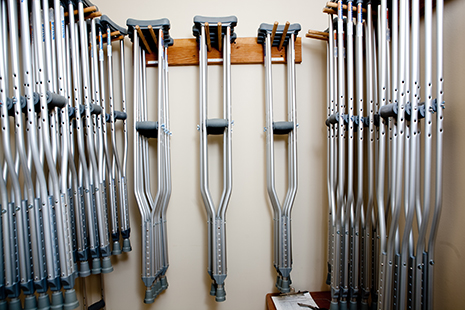Center Releases Improved Version of Online Tool for Adopting Universal Standards for Health-Care Data

The updated Levels, Readiness and Impact Model helps health-care providers adopt universal standards for identifying and locating all health-care related materials, including crutches, implants and operating room products.
FAYETTEVILLE, Ark. – Researchers at the Center for Innovation in Healthcare Logistics at the University of Arkansas have released an improved version of an online decision-support tool that has helped a wide range of health-care providers adopt universal standards to identify materials, locations and partners within the U.S. health-care system.
In January of 2012, the center began offering the Levels, Readiness and Impact Model (LRIM) 6.0 to help health-care providers – regardless of their degree of readiness in terms of structure, processes, personnel or technology – adopt GS1 global data standards for product and location identification in their supply chains.
GS1 is a not-for-profit international association that designs and implements product standards to improve supply-chain efficiency. More than 140 organizations have accessed the U of A-produced tool since it was initially offered one year ago.
The updated model expands on the previous version by introducing a newly designed interface, which allows users to enter small amounts of data and instantly see the investment and impacts of their choice. The tool also now includes catheterization, implanted-device, and operating room products. Those products join previously modeled materials management and administrative processes for medical and surgery items. The final new feature of the tool is its ability to save and compare the results from different GS1 scenarios.
The tool is free and downloadable. It uses a spreadsheet format to help guide health-care providers through planning and adoption of GS1 global data standards.
“LRIM is designed to provide a user-friendly, Microsoft Excel-based spreadsheet tool to help providers meet their need to quantify the investments and benefits they can expect from GS1 adoption choices,” said Ron Rardin, center director and Distinguished Professor of industrial engineering.
“The model provides detailed quantitative foundations on which those economic assessments can be constructed for particular provider adoption paths,” said Nebil Buyurgan, co-investigator and associate professor of industrial engineering.
The health care sector of GS1 developed global trade item numbers and global location numbers, which act as barcode identifiers for the different products and supply-chain locations. The standardization of products is something other industries adopted many years ago. Health care has lagged far behind.
Just how far the industry is behind was documented in a 2009 Center for Innovation in Healthcare Logistics study, performed by U of A industrial engineering associate professors Heather Nachtmann and Edward Pohl, which brought to light the inefficiencies and expense of the system. Nachtmann and Pohl described the U.S. health-care supply chain as immature and expensive with significant barriers to efficiency. They further noted that only a minority of health care providers had taken the initial steps to adopting universal standards.
The Center for Innovation in Healthcare Logistics is an industry-university partnership that leads a nationwide effort to identify and foster system-wide adoption of innovations in health-care supply chain and logistics. The center facilitates collaboration among researchers at the U of A, health-care providers and industrial sponsors.
Topics
Contacts
Ron Rardin, Distinguish Professor, industrial engineering
College of Engineering
479-575-6033,
rrardin@uark.edu
Will Bryan, science and research communications intern
University Relations
479-575-6645,
wxb004@uark.edu
Matt McGowan, science and research communications officer
University Relations
479-575-4246,
dmcgowa@uark.edu
Headlines
PetSmart CEO J.K. Symancyk to Speak at Walton College Commencement
J.K. Symancyk is an alumnus of the Sam M. Walton College of Business and serves on the Dean’s Executive Advisory Board.
Faulkner Center, Arkansas PBS Partner to Screen Documentary 'Gospel'
The Faulkner Performing Arts Center will host a screening of Gospel, a documentary exploring the origin of Black spirituality through sermon and song, in partnership with Arkansas PBS at 7:30 p.m. Thursday, May 2.
UAPD Officers Mills and Edwards Honored With New Roles
Veterans of the U of A Police Department, Matt Mills has been promoted to assistant chief, and Crandall Edwards has been promoted to administrative captain.
Community Design Center's Greenway Urbanism Project Wins LIV Hospitality Design Award
"Greenway Urbanism" is one of six urban strategies proposed under the Framework Plan for Cherokee Village, a project that received funding through an Our Town grant from the National Endowment for the Arts.
Spring Bike Drive Refurbishes Old Bikes for New Students
All donated bikes will be given to Pedal It Forward, a local nonprofit that will refurbish your bike and return it to the U of A campus to be gifted to a student in need. Hundreds of students have already benefited.




